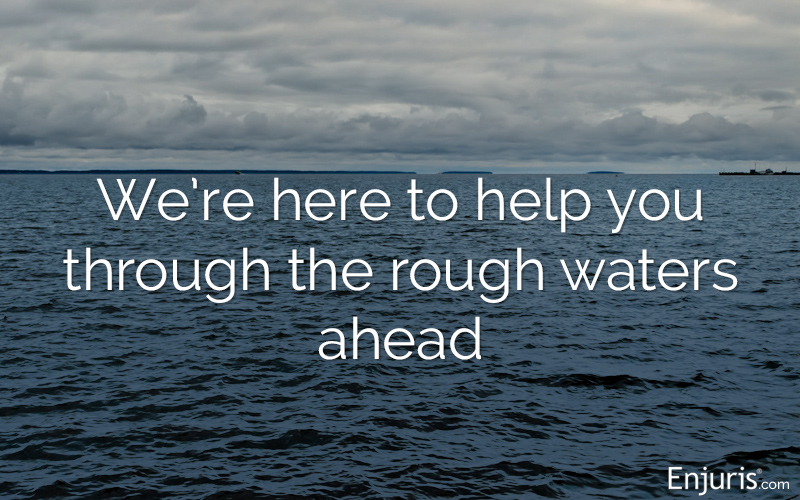What laws apply to boat accidents in the Hoosier State? Can you sue?
Indiana is home to some of the most beautiful lakes in the country. There’s Lake Lemon in central Indiana, Lake Tippecanoe to the north, and Patoka Lake to the south. What’s more, the Ohio River flows through the Hoosier State.
Indiana residents are well aware of the opportunities for boating in their state. More than 208,000 boats are currently registered in Indiana.
Although boating is a popular recreational activity, the laws associated with boating are not well known. With that in mind, let’s take a look at boat accidents and boating laws in the Hoosier State.
Indiana boat accident statistics
When it comes to the number of boat accidents every year, Indiana is a relatively safe state.
There were 40 reported boat accidents in Indiana in 2019. Looking at the surrounding states, there were 39 reported boat accidents in Kentucky, 75 in Illinois, 128 in Michigan, and 128 in Ohio.
| Indiana boat accidents (2014-2019) | ||
|---|---|---|
| Year | Fatal accidents | Total accidents |
| 2014 | 9 | 40 |
| 2015 | 5 | 43 |
| 2016 | 6 | 40 |
| 2017 | 7 | 57 |
| 2018 | 8 | 43 |
| 2019 | 11 | 40 |
| Source: United States Coast Guard 2019 Recreational Boating Statistics Report | ||
Common causes of boat accidents
Each year, the U.S. Coast Guard releases its Recreational Boating Statistics report, which looks at the top 5 accident types and top 10 boat accident contributing factors:
| Top 5 boat accident types (2019) | |||
|---|---|---|---|
| Accident type | Number of accidents | Number of deaths | Number of injuries |
| Collision with recreational vehicle | 1,071 | 47 | 650 |
| Collision with fixed object | 493 | 44 | 326 |
| Flooding/swamping | 413 | 16 | 253 |
| Grounding | 399 | 45 | 124 |
| Falls overboard | 299 | 189 | 122 |
| Top 10 boat accident contributing factors (2019) | |||
|---|---|---|---|
| Contributing factor | Number of accidents | Number of deaths | Number of injuries |
| Operator inattention | 546 | 36 | 296 |
| Improper lookout | 506 | 26 | 425 |
| Operator inexperience | 458 | 39 | 273 |
| Machinery failure | 358 | 22 | 325 |
| Excessive speed | 282 | 113 | 221 |
| Alcohol use | 274 | 18 | 93 |
| Force of wake/wave | 235 | 21 | 141 |
| Weather | 184 | 31 | 58 |
| Navigation rules violation | 170 | 48 | 87 |
| Hazardous water | 140 | 12 | 117 |
Indiana boating laws
In Indiana, boating is governed by state and federal laws. Most of the state laws can be found in Title 9 of the Indiana Code and Title 312 of the Indiana Administrative Code. Most of the federal laws can be found in Title 33 of the Code of Federal Regulations.
Boating laws in Indiana are mostly enforced by the conservation officers of the Indiana Department of Natural Resources (IDNR) and the U.S. Coast Guard.
Let’s review some of the laws you need to know before and after you board a boat in Indiana:
Before going out on the water
An Indiana certificate of registration is required to operate a vessel legally on public water unless the vessel is non-motorized. This means the following vessels, among others, must be registered:
- Vessels using an electric trolling motor
- Pontoon boats
- Jet skis
- Jetboat
- Motor yacht
A certificate of registration can be obtained at any Bureau of Motor Vehicles (BMV) License Branch in the state. The registration number (and excise tax decals) must be displayed on both sides of the bow of your boat.
In most cases, boat operators must have a valid Indiana driver’s license. The main exception is that a motorboat operator who is at least 15 years old can operate a motorboat or personal watercraft until they become a licensed operator if they first complete a boater education course approved by the IDNR.
No one under 15 years of age may legally operate a motorboat greater than 10 horsepower or a personal watercraft.
Before you go out on the water, make sure your boat is equipped with the following legally required personal flotation devices:
- One wearable (Type I, II, III, or V) U.S. Coast Guard-approved personal flotation device for each person on board or being towed
- One Type IV U.S. Coast Guard-approved personal flotation device on board and readily accessible (for vessels 16 feet in length or longer)
Boating checklist (for before you go out on the water)
Here’s a quick checklist from the IDNR to help make certain you’re ready to take your boat out on the water.
- Is the motorboat properly registered and are the proper numbers and decals displayed?
- Do you have the required number of personal flotation devices and are they in good condition?
- Does the number of passengers fall within the vessel’s capacity rating?
- Have you checked to make sure all the essential equipment, including fuel and lights, is sufficient and in proper working order?
- Do you have plans for any emergencies that may arise, such as a mechanical breakdown or storm?
- Are you aware of the local operating conditions, including navigational hazards, dams, currents, etc.?
On the water
A person must operate a boat in a reasonable and prudent manner and must not operate a boat in a manner that unnecessarily endangers the person or property of another person or unnecessarily interferes with the safe and lawful use of public waters by another person.
Some examples of unreasonably dangerous actions include:
- Operating a vessel at speeds of more than 10 mph between sunset and sunrise
- Weaving a vessel through congested waterway traffic
- Loading your vessel beyond the recommended capacity
- Cutting between a boat and the individual or individuals being towed by the boat
- Crossing paths with another watercraft when visibility around the watercraft is so obstructed as to endanger human life, human physical safety, or property
- Steering a personal watercraft toward an object or individual in the water and turning sharply at close range in a way that endangers human life, human physical safety, or property
It’s illegal to operate a vessel while intoxicated due to alcohol or any combination of alcohol, controlled substances, or drugs.
As is the case when operating a motor vehicle, a blood-alcohol level (BAC) of 0.08% is proof that you’re intoxicated. However, you can still be charged with a BAC of less than 0.08% if your use of alcohol, controlled substances, or drugs impairs you to the extent that you lose normal control of your faculties to such an extent as to cause danger to others.
What immediate steps do I need to take if I’m in a boat accident?
If you’re involved in a boat accident in Indiana, you’re required by law to:
- Stop and remain at the scene to give assistance, including ensuring that anyone who’s injured receives medical treatment
- Provide your name, address, and vessel registration information to any person injured in the accident
- Report the accident (notify the county sheriff, the nearest state police post, or the nearest conservation office as quickly as possible)
- File an accident report with the IDNR within 24 hours of the accident if a person dies, disappears, is injured, or there is damage to the vessel that exceeds $750
Who can be held liable for a boat accident?
Indiana Code 14-1-1-16 states that:
“Every person operating any boat must operate the [boat] in a careful and prudent manner.”
The Indiana Supreme Court held that the duty to operate a boat in a “careful and prudent manner” is similar to the duty to operate a motor vehicle with a “reasonable degree of care.”
Consequently, to receive compensation in a boating accident, you need to prove that someone else failed to act in a careful and prudent manner (i.e., with reasonable care) and that their carelessness caused your accident.
To put this in legal terms, you need to prove that someone else was negligent.
Parties that might be negligent in a boat accident include:
- Another boat operator
- A boat owner
- A manufacturer
- An employer
The lawsuit was settled for an undisclosed amount.
Types of damages available in an Indiana boat accident
The purpose of damages in a personal injury lawsuit is to put the injured party in the position they would have been in had they never been in an accident.
If you’re injured in a boat accident in Indiana, you may be able to recover the economic and noneconomic damages that stem from your accident. Here’s a breakdown of what’s included in each of those categories.
| Economic damages | Noneconomic damages |
|---|---|
| Medical expenses | Physical pain and suffering |
| Lost wages (past and future) | Emotional distress |
| Property damage | Loss of consortium |
Still have questions? Ready to schedule an initial consultation with an Indiana personal injury attorney?
Our online lawyer directory can help get you started.
See our guide Choosing a personal injury attorney.


